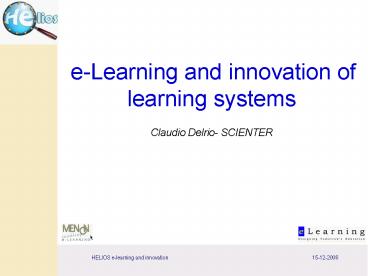HELIOS elearning and innovation 15122006 - PowerPoint PPT Presentation
1 / 11
Title:
HELIOS elearning and innovation 15122006
Description:
In which way is eLearning contributing to Personal Development & Citizenship? ... Non professional learning communities. e-Learning as a side effect in communities ... – PowerPoint PPT presentation
Number of Views:89
Avg rating:3.0/5.0
Title: HELIOS elearning and innovation 15122006
1
e-Learning and innovation of learning systems
Claudio Delrio- SCIENTER
2
Policy priorities and research themes
- To what extent eLearning is an effective means to
improve Access to Learning opportunities? - How much eLearning helping European citizens to
achieve better Employability? - In which way is eLearning contributing to
Personal Development Citizenship? - Which impact has eLearning on the
Internationalisation of ET Systems in Europe? - Is eLearning a facilitator of Organisational
Change in eLearning users organisations? - How and how much eLearning is supporting
Innovation Processes in ET Organisations?
3
e-Learning impact on Access to learning
- e-Learning has managed to go deeper instead
that wider - No one size fits all solution
- Spurring motivation to learn
- Overcoming access barriers
- Need to tackle at once several factors of
deprivation - Scarce sustainability of e-L projects
4
e-Learning impact on Access to learning
- Do excluded groups really benefit from
e-learning? - Which part of e-learning investments is actually
addressed to increasing access? - Are strategies based on community access more
effective than strategies based on individual
access? - Is there a concrete risk that e-learning policies
and initiatives (private) can actually increase
social divide? - Is it provable that Human support is a key factor
in effective learning access? - Is there a trade off between quality of support
and quantity of learners served?
5
e-Learning impact on Employability
- It works better for those already at work
- Deemed most suitable for basic skills and less
for soft/transversal skills - Significant potential in the presentation of
learning achievements (e-portfolio) - Market the benefit of quality e-L towards the
employers - Better measurement of the ROI in terms of
employability of learners
6
e-Learning impact on personal development
- Need for better personalisation of e-L solution
- Encouraging humanisation of e-L (game-based,
communities.) - Potential for work-life balance
- Empathic and open online communities or groups
of alikes?
7
e-Learning and internationalisation
- Increasing exchanges based on physical and
virtual mobility - International and local
- To establish reliable systems of worldwide
accreditation? - To increase the recognition of qualifications
obtained - Consider ownership, open educational resources
and inter-operability standards across boundaries
- Develop partnerships at all levels
8
e-Learning and organisational change
- Change of vision/strategy
- Change in organisational culture
- Change in the way that the organisation operates
- Change in the way that the organisation is
structured - Change in the way training/learning is organised
- Change in social relations or interactions
between personnel in the workplace (e.g.
collaborative on-line communities, virtual
leadership)
9
e-Learning and innovation
- Is e-learning contributing to open up formal
education to the wider world? - Is e-learning increasing the ownership of
learning experiences, i.e. the take up of
responsibility by learners about their learning
experiences within formal education contexts? - Has e-learning increased the quality of learning
provision into formal education settings? - Has e-learning produced significant
organisational change in ET institutions? - Is e-learning more stimulating or more concerning
the TT community? - Has the use of ICT substantially renovated the
way of teaching and learning in ET institutions?
10
E-learning territories
Informal learning
e-Learning as a side effect in communities
Individual development throught e-learning
Virtual Professional networks
Non professional learning communities
E-L workplace
Intra-muros
Extended learning context
Inter-organisational development through
e-Learning
E-learning in VET
Evolved distance education
E-L in schools
E-L in tertiary education
ICT for virtual mobility
TTT via e-L
Formal Learning
11
E-learning territories
Informal learning
e-Learning as a side effect in communities
Individual development throught e-learning
Virtual Professional networks
Non professional learning communities
E-L workplace
Intra-muros
Extended learning context
Inter-organisational development through
e-Learning
E-learning in VET
Evolved distance education
E-L in schools
E-L in tertiary education
ICT for virtual mobility
TTT via e-L
Formal Learning































